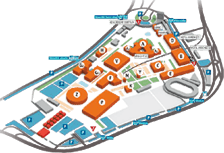IDET
24.-26.5. 2023
International Defence and Security Technologies Fair

New technologies bring new threats
Ways to counter them effectively were the focus of ITTE 2013 international conference with the theme "Live Defence Against Cyber-Attacks On State Critical Infrastructure". Participants from both the military and the civilian sector discussed options for solving these new problems and saw demonstrations of defence against external and internal attacks.
At the beginning of the meeting, the President of the organizing AFCEA Czech branch Josef Strelec, director of the National Security Office Dušan Navrátil and Chief of Staff of the Army of the Czech Republic Petr Pavel held their speeches and agreed on the severity of the topic. "Czech army pays attention to this issue and works closely with the National Security Agency. These attacks must not be underestimated and therefore we need to demonstrate how devastating the consequences can be," said Lieutenant General Pavel and thanked the organizers of the conference which he described as very useful. "I believe that this meeting will bring not only the exchange of knowledge and experience but it also show how and where to go further in this area," he added.
The conference itself was divided into several sections and workshops and speakers included leading experts in the field of cyber security from the Czech Republic and abroad. Journalist and university teacher Jiří Peterka presented a live simulation of an attack of the DoS type, or Denial of Service at the workshop. "The attack, where an enormous number of requests comes from one place to a specific web site belong to common risks today and operators are faced with it more and more. The website is overloaded and can no longer accept other requests, and thus it seems to be unavailable to ordinary users," said Peterka. Live demonstration took place on two screens, thus next to the presentation describing the events currently taking place, workshop participants could also watch the web page being attacked. The presentation included generating the load which brought the site out of order, and a demonstration of a system that allows one to monitor the load. It was showed how to stop the load by blocking the route or source of a large number of requests and finally the operation of the site was restored to its original condition.
"The workshop can not simulate an attack from many sources, so we only showed an attack from one DoS source. A common attack that happens on the internet, however, comes from many sources, i.e. DDoS (Distributed Denial of Service). In March, these attacks took place in the Czech Republic and we still do not know who caused them," said Jiří Peterka. The demonstration was aimed at managers who should know about what was happening during an attack and how it proceeds. He pointed out that it is not possible to be perfectly secure against cyber attacks, but one can prepare for them. It is important not to underestimate prevention, which is based on educating staff, establishing safety rules and imposing discipline in their compliance. In case of attack, one needs to create backup plans to have a clear course of action, and above all create a security team able to stop the attack and return the system to its functionality. "The threat of attacks is unfortunately still growing, but fortunately the knowledge of the people who have to fight the attacks grows as well. They have no choice but to learn to defend. Although they may be unable to completely block the attacks, they can protect the site against them and take action, which will make the impact not be nearly as great as the attackers hope," explained Peterka.
The conference was also actively attended by companies whose products and services contribute to the increase in cyber security. Symantec, which monitors active threats, reported a rapid increase particularly in the area of mobile threats. The amount of mobile malware increased worldwide by 58 percent in 2012. The cause however is not an increase of security weaknesses in mobile operating systems, since attackers are primarily focused on Android, which had only minimum security vulnerabilities compared to other systems. At the same time there was a significant increase in the number of attacks on small businesses, which often did not have adequate security and due to trade links with large companies may become an easy way to the real targets of attacks.
Concurrently with
You might be interested in
Highlights from companies







